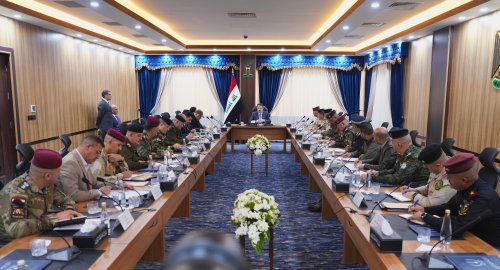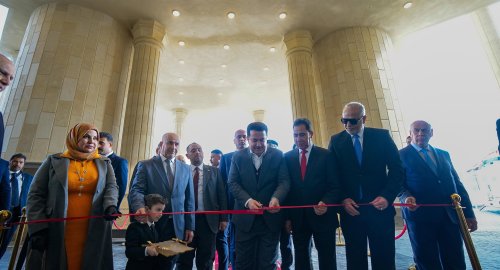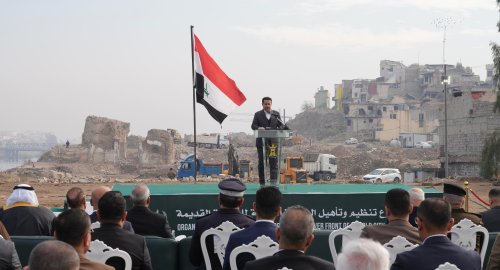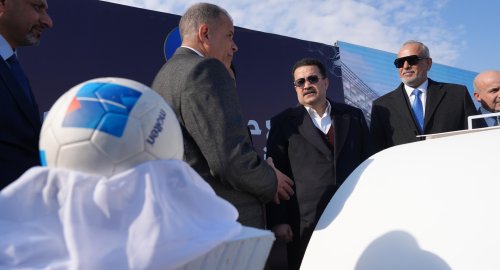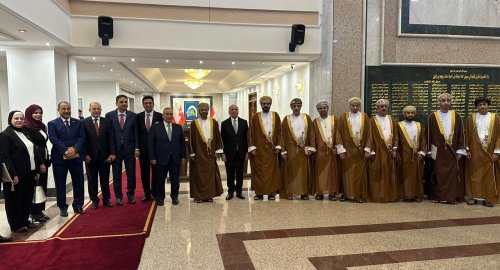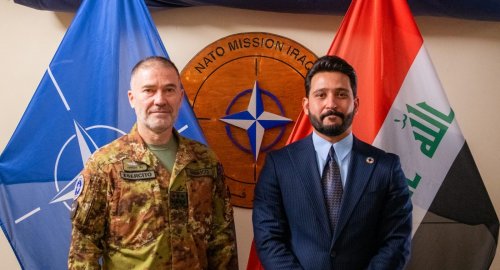
Including al-Hol camp and demining.. (INA) opens 14 files with the NATO mission in Iraq

- 5-09-2022, 20:36
Baghdad- Harith Al-Abadi
The NATO mission in Iraq (NMI) elaborated today, Monday, the reasons for increasing its forces in Iraq, and while referring to the details of its agreement, which includes 14 goals, NMI clarified its role towards removing mines and returning families from al-Hol camp.
The purpose of the NATO mission in Iraq (NMI)
The commander of the NATO mission in Iraq, General Giovanni M. Iannucci, said in an interview with the Iraqi News Agency (INA)," NATO Mission Iraq (NMI) is a non–combat, advisory and capacity-building mission, launched at the NATO Summit in 2018, following a request and invitation from the Government of Iraq. NMI assists Iraq in building more sustainable, transparent, inclusive and effective security institutions and forces, so that they themselves are able to stabilize their country, fight terrorism, and prevent the return of Daesh.
To achieve this, NATO advises Iraqi defence and security officials mostly in the Ministry of Defence, Office of the National Security Advisor, and the Prime Minister’s National Operations Centre. The mission also supports Iraq’s military education institutions. Areas of support include policy and strategy, force generation and development, leadership development and good governance in the security sector. We also advice on logistics, cyber defence and the training Non Commissioned Officers. One of the first and most important achievements NMI made in collaboration with their Iraqi colleagues was an agreement and codification of 14 primary objectives for NMI-Iraqi cooperation. The 14 objectives provide a common frame of reference and goals to achieve through Iraqi hard work and NATO advising. This allows NATO to align their expertise to Iraqi identified areas in need of improvement, which included specific fields such as education, logistics, cyber, systematic training and NCO development, as well as advancing important institutional concepts such as accountability, and interoperability.
Increase the size of the mission in Iraq from 500 personnel up to 4,000
General Iannucci affirmed that ," The decision to gradually expand the mission in time and depending on circumstances was taken back in February 2021 by NATO Defence Ministers, following a request by the Iraqi government. The decision was aimed at strengthening Iraq’s armed forces in its fight against a resurgent Daesh. Our presence is conditions-based and any increases in troop numbers will be incremental, based on requirements and consent from the Iraqi authorities. Our mission continues to be carried out with full respect for Iraq’s sovereignty and in full consultation with the Iraqi government. Currently, several hundred personnel from 30 NATO members and three partner nations (Australia, Finland and Sweden) are assigned to our missions. The size of the force remains largely similar to what it was a few years ago, also due to the COVID pandemic.
Combating Daesh
NMI Commander emphasized that “Iraqi security forces have shown great courage and improved tactical prowess in defending Iraq from Daesh, but the remnants of this terrorist group remain, and the effort to sustain the fight to root those remnants out will continue to be a challenge. NATO also continues to assist the Iraqi Forces in sustaining and improving their ability to secure Iraq in the long term. The Iraqi government has requested NATO’s assistance for sustainable improvements in processes and institutions. Iraq has made great progress in the fight against Daesh, and NMI works with our Iraqi partners to ensure that their processes and systems are sustainable.”
NATO non-military tasks in Iraq
NMI Commander said that “the cooperation between the Iraqi Armed Forces and NATO Mission Iraq focuses on a range of objectives, jointly identified by NATO and Iraq, and is designed to improve Iraqi institutions and processes. Our collaboration involves offering advice to senior leaders, sharing best practices and expertise, supporting budgeting and programming, countering corruption and enabling organizational modernization. We also support increasing the role of women within the Iraqi Forces. NMI advises at the institutional level, including the Ministry of Defence and High Military Education Canters and Academies. Reforming institutions can take longer than training individual soldiers but the results achieved have a real long-term impact.”
NATO role in combating (IED), (EOD) and removing mines
He continued," Iraqi civilians still face the dangers of landmines and IEDs from conflicts new and old. NMI advisors are not engaged in clearing mines or IEDs, but NMI will have an important role by advising the Iraqi Counter-IED school on training, streamlining the organization, as well as programming and budgeting. Our goal is to build the capacity of the Iraqis to eliminate the scourge of mines and IEDs themselves.”
Civil-military planning
He also clarified that NMI works with our Iraqi counterparts on civil-military planning, including advising on human resource management, budgeting, logistics, and promoting good governance. We also collaborate on crisis management, which includes developing structures and capabilities to respond to natural disasters, such as floods or earthquakes. Civil-military integration and planning are an important part of our mission. Supporting military medicine is part of our advice on logistics, policy and institution building. We also provide advice to the Military Medical School.
NMI role for disarmament and anti-corruption
NMI commander affirmed that “NMI-Iraqi collaboration promotes institutional processes and documentation that enable Iraqis to fight corruption and maximize the capability produced by the investment the Iraqis have made in their security forces. Supporting Iraqi Anti-corruption efforts and promoting the rule of law are definitely NMI priorities. NMI also supports the rule of law by providing conferences and lectures on International Humanitarian Law (IHL) and the Law of Armed conflict (LAC), contributing to UNAMI’s International Gender Group and distributing information on the subject.”
He also added,"Our Iraqi counterparts must decide for themselves how to organize their structures and institutions. NATO’s aim is to provide expertise, advice and support – that is what we are here to do. That includes recommendations on how to make Iraqi institutions more effective, transparent and inclusive. But it will be for the Iraqis to decide exactly how to reform their respective security structures and institutions.”
Developing military force structures
He pointed out," Among many other things, we are working on curriculum development, faculty development and Institutional Education Development – essentially creating the conditions for learning and developing quality management. Those are important work strands, which contribute to increase and develop the operational readiness of the Iraqi Armed Forces.”
Further more and regarding reforming the Iraqi security sector, the General Giovanni M. Iannucci assured that: " We are working together with other relevant International Organizations. NMI operates in close coordination with our partners, the Global Coalition and other members of the International Community, including the UN and the EU".
The non-recurrence of the terrorist group ISIS in Iraq
NMI commander also continued," We commend the Iraqi Security Forces for their achievements in countering DAESH and are cognizant of the price they paid for this effort. We help to develop sustainable security institutions and to maximize the capability the Iraqi Armed Forces. Our goal is to create a sustainable and capable Iraqi security force that can keep the pressure on Daesh, without external assistance. DAESH continues to pose challenges to Iraq, the region and the rest of the world. That is why NATO and its partners are committed to continue fighting against terrorism. At the June NATO summit held in Madrid, Allies made clear they will “continue to counter, deter, defend and respond to threats and challenges posed by terrorist groups “and this includes Daesh. We are grateful for the fundamental contribution that Iraq provided, and still provides, in countering terrorism. This is important both for Iraqi and for NATO.”
NATO plan for 2022
Iannucci said “NATO develops plans well in advance. They are demand-driven and tailored to the Iraqi needs. Everything we do is planned in order to provide appropriate funding and skilled personnel. We have an ambitious plan of activities for military and security sector educational institutions in the Greater Baghdad Area this year. Our plans are developed in full coordination with the Iraqi institutions to meet their needs and their requirements.”
The support provided by the NATO mission to Iraq in the field of advice and training
NMI commander said," We believe that our advising Iraq on its efforts to create a more capable, sustainable and effective Iraqi Armed Forces, will result in a more secure and stable Iraq. By providing advice and expertise to Ministry of Defense and military educational Institutions, we are contributing to Iraqi Armed Forces and Security Institutions to build sustainable, more effective, transparent and inclusive security structures. This will enable them to face current and future security challenges and contribute to a more stable security situation in Iraq and the region.”
NATO projects
NMI commander said," The advice and counsel offered to the Iraqi Army is aimed at raising the effectiveness of the Armed Forces. More importantly, the Iraqi Ministry of Defense has agreed with NMI on the 14 long-term objectives to create stronger and more reliable Armed Forces, which promotes a safer and more secure Iraq. In other words, the Iraqi MOD and NMI agree that NMI efforts are designed to enhance the capabilities of the Iraqi Armed Forces, because we have agreed on the areas of focus for advice and counsel.”
Al-Hol camp
NMI commander said," NMI does not have a mandate to operate in Syria, but clearly the humanitarian and security situation in Syria is very challenging. That is why I commend the great efforts by the Iraqi government in repatriating hundreds of families from Syria. Several NATO countries are also engaged in repatriating, prosecuting and/or rehabilitating individuals and their families who are in such camps. This is not an easy task due to security and humanitarian challenges.”
Prime Minister inaugurates new Nineveh Governorate building
- politics
- 04:30
US Central Command: We killed ISIS terrorist leader Abu Yusuf in Syria
- International
- 24/12/20
Liverpool compete with Real Madrid to sign Olympique Lyonnais star
- Security
- 24/12/19
ISC, ADX discuss Strengthening Economic Ties
- Economy
- 24/12/16
Iraq assumes presidency of Arab Investment Company’s Executive Board
- Economy
- 24/12/17



